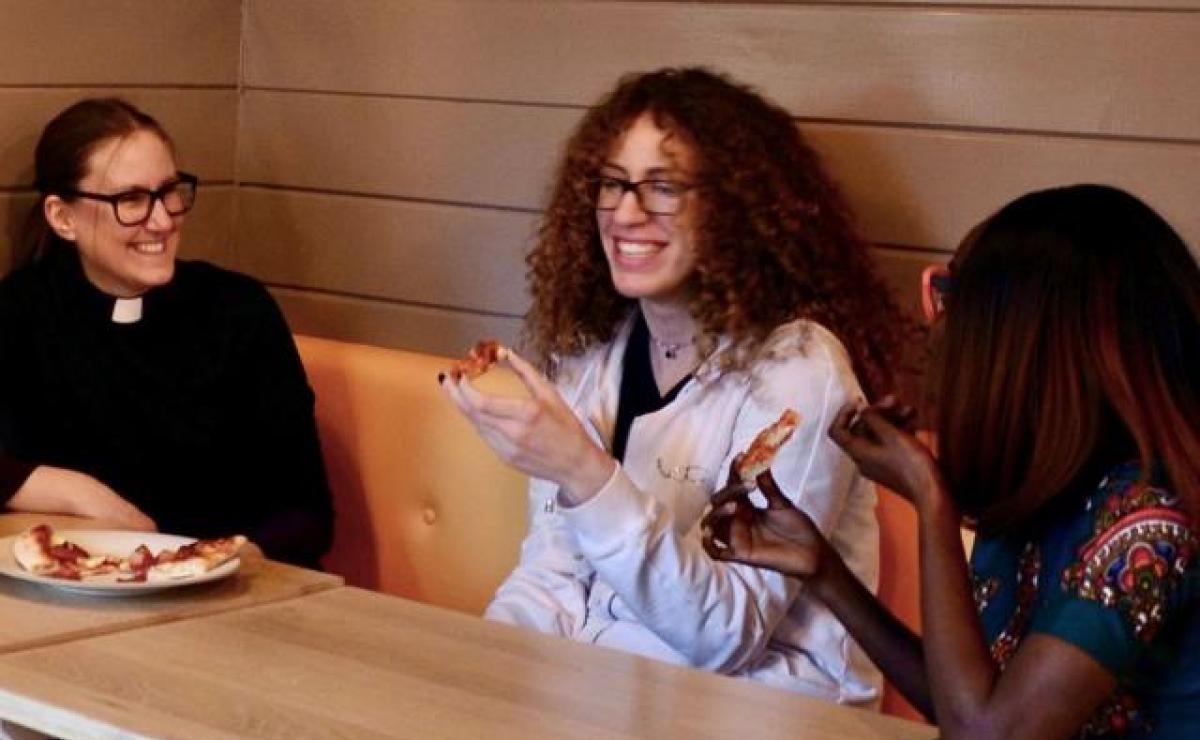UK: Student chaplaincy beyond the chapel walls

Voices from the Communion: Rev. Sarah Farrow
(LWI) - “Always questioning,” is how Rev. Sarah Farrow describes her Lutheran identity and the students she walks alongside in her chaplaincy work. Farrow is college chaplain for Mansfield College, University of Oxford, Lutheran chaplain at King’s College, London, and chaplain for the International Lutheran Student Centre through the Council of Lutheran Churches, UK.
Farrow also serves as assistant pastor at St. Anne’s Lutheran Church in London, one of 13 churches belonging to The Lutheran Church in Great Britain (LCiGB) synod , a member church of the Lutheran World Federation (LWF).
“Questioning and giving when times call for change and generosity,” is how she describes her role as chaplain with students from various religious and faith traditions. For Farrow, this is demonstrative of what she believes to be core Lutheran values.
How do you define chaplaincy?
Chaplaincy is based on trust. Chaplaincy is beyond the walls of the church, therefore, it is about being alongside someone.
What do you do as a student chaplain?
As a student chaplain, I am in a very special position because I am not an academic. I am not going to judge how a student is performing, nor am I the administration that wants to ensure the student stays registered. But as chaplain, there is no agenda apart from being here.
I offer an open space for them to say whatever they can’t say anywhere else or to anyone else. But it takes trust and time, especially when you are wearing a clergy collar to get to that point of openness. Some may have concerns that the chaplain is there to try to convert them. I am not here to push my faith. That is how we proclaim the Gospel.
I also serve as chaplain to the staff and faculty as well, and the same holds true with those relationships.
What have you found remarkable about working with the students, faculty and staff at Mansfield?
The history of Mansfield is as a non-conformist college. Mansfield was a college to welcome dissenters who refused to conform to the Church of England and historically excluded from studying or participating in the religious life at the University of Oxford. Initially, Mansfield was associated with the Congregationalists but also welcomed other reformed thinkers. The Lutheran World Federation used to provide a Lutheran tutor for students years ago when the college was still training ministers for ordination.
To this day, Mansfield welcomes students who may feel Oxford isn’t a fit for them. Its outreach is celebrated among the Oxford colleges with over 90% of our UK undergraduate students coming from state-funded schools and having the highest proportion of black, Asian and minority ethnic group students and students who are the first in their families to go to university. It makes for a fantastic community, and one that is also flying high academically. Mansfield ranked 5th of the 39 Oxford colleges for academic results.
What I find most remarkable is how the community at Mansfield gives when there is a need. There was a huge chapel built on campus during the days of ministerial training and continues to operate presently long after ordination training stopped. But as the student body at Mansfield grew and there was not enough space for dining, the college converted the chapel into a dining hall - a bold step for an Oxford college, but not for one so proud of its non-conformist past, and keen to do things differently. As a chaplain, I find that comforting. Jesus’ teaching and ministry wasn’t always in the synagogue but was often at meals in fellowship with others, so I find it amazing that at Mansfield we can have our dinners together surrounded by this still functioning chapel, having that space to hold us while we get to know each other.
With the pulpit, choir box and all the chapel imagery at the edges of the dining hall, still being used for chapel, it is reflective of the college’s history as non-conformists, as students who were always asking, “What does the community need right now, and how do we provide that while keeping in mind our grounding in the teachings of the Bible?”
How have you been able to respond to the needs of your students during the Coronavirus (COVID-19) pandemic?
Practically, with my London students from the International Lutheran Student Center, we do an evening prayer over Zoom. At Mansfield, we have a chapel webpage that gives them, “Cause for Pause”, a curated self-led online service, along with social events online such as welfare teas and a crafting night on Zoom, for example.
What I struggle with as a chaplain is the loss of that personal encounter; standing in line with a person in the café and being able to say “How are you?” “How are your classes this week?”
As college chaplain, I feel that we may miss out on a lot with organized activities because those events need buy-in, it needs a person to make a choice to engage in that event before showing up. In contrast, with in-person and casual encounters, it doesn’t require anything other than just being where you are.
Which points back to what chaplaincy is to me and that is being alongside each other.
Rev. Sarah Farrow finds other ways to walk alongside her students during the COVID-19 shutdown. Photo/screenshot: by Rev. Sarah Farrow
Have you found other ways to be with students?
A bit. In a recent online session with my London students, I noticed they appeared weary on camera, were waiting cautiously for others to speak; they were tired. In person, I am used to being an energetic presence but it was difficult for me to transfer that online. So, I had hacky sacks (a small cloth toy filled with sand for kicking around) delivered to their dormitories with a note that said, “This is a hacky sack to lift your spirits and your feet.” It was a creative way to engage with them while separated, other than online – it was something to get us out of ourselves.
It is certainly a time to think outside of the box. It is a good time to be Lutheran because our Lutheran identity seems to make us stop and rethink what we are doing. As Lutherans we ask, “Why are we doing what we are doing? Should we be doing what we are doing?” If not, let’s try a different way.
I appreciate the freedom that we have as Lutherans to ask those questions.
What do you think the church can learn from the closures?
It is time to put our thinking caps on! I hope the closures will help the laity appreciate their role in the church and their confidence in being a member of “the priesthood of all believers.” This may be a positive legacy of this pandemic.
How do you define your Lutheran identity?
Service to our neighbors. Living out the Gospel, understanding that when we talk about the Gospel, it is knowing that God loves us so much that God gave us all of God’s self through Jesus Christ and that we are unconditionally loved through grace. Grace is at the core of who we are and that is something that can’t be held within one’s self, it has to overflow to those around us.
Going to church every Sunday is how we are nourished, yes, but it can’t remain there, we have to live it out in how we treat our neighbor, the pandemic has shown us this .
I often point my students to LWF resources as a way to start conversations. I use the resources, particularly on gender and climate justice, as talking points.
University of Oxford's Bonavero Institute of Human Rights is housed at Mansfield College, and the college is also drafting policy to become a refugee Sanctuary College.
The Lutheran World Federation is a global body that shares the work and love of Christ in the world. In this series, we profile church leaders and staff as they discuss topical issues and set out ideas for building peace and justice in the world, ensuring the churches and communion grow in witness and strength.
